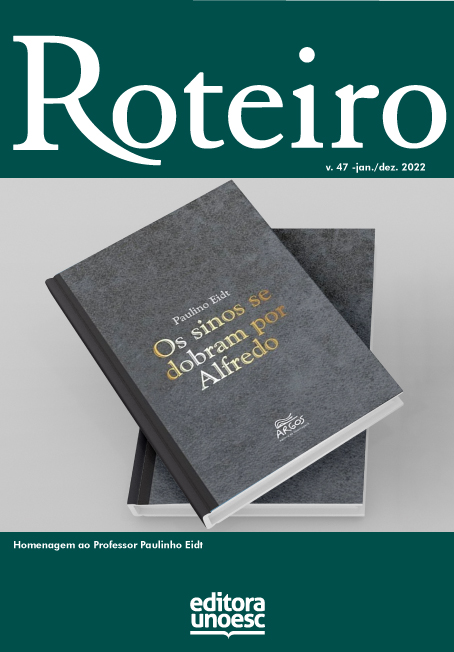The reduction of the role of the teacher-master to the illusional condition of an entrepreneur
DOI:
https://doi.org/10.18593/r.v47.28387Keywords:
Educational Neoliberalism, Teaching on Basic Education, Teacher Training, Reflective ThinkingAbstract
In the present study, the reduction of the role of the teacher to the condition of collaborator in the educational environment is problematized. This reduction represents the removal of this professional from a position of master/educator engaged in human training to that of an entrepreneur who submits his autonomy and intellectuality to the demands of the school that adopts the business dynamic. Through the analytical-hermeneutic method, the hypothesis is developed that such change of nouns hides the articulation with neoliberal rationality, objectifying the master/educator and conceiving his function as subordinate to the wishes of the commercial sector regarding the training offered on basic education. From this, we retake the ideas of John Dewey (1979) about the role of the teacher in the educational process, in the search for the formation of active and reflective subjects, capable of understanding and acting in the society in which they live, pointing out perspectives for facing the bias that tries to make them a mere reproducer of capitalist expectations in education. Organized in three sections that follow the system indicated, the article is of a basic nature, qualitative in terms of approach, exploratory in terms of its objectives, and bibliographical in terms of procedures.
Downloads
References
ANTUNES, R. O privilégio da servidão: o novo proletariado de serviços na era digital. São Paulo: Boitempo, 2018.
BALL, S. J. Educação Global S. A.: Novas redes políticas e o imaginário neoliberal. Ponta Grossa: UEPG, 2014.
BRASIL. Plano Diretor da Reforma do Aparelho do Estado. Brasília: Presidência da República, Câmara da Reforma do Estado, 1995. Ministério da Administração Federal e Reforma do Estado. Disponível em: http://www.bresserpereira.org.br/documents/mare/planodiretor/planodiretor.pdf. Acesso em: 9 jan. 2021.
DARDOT, P.; LAVAL, C. A nova razão do mundo: ensaio sobre a sociedade neoliberal. Tradução Mariana Echalar. São Paulo: Boitempo, 2016.
DEWEY, J. A escola e a sociedade, a criança e o currículo. Tradução: Paulo Faria, Maria João Alvarez e Isabel Sá. Lisboa: Relógio D’água, 2002.
DEWEY, J. Como pensamos. Tradução: Haydée Camargo Campos. São Paulo: Nacional, 1979a.
DEWEY, J. Democracia e educação. Tradução: Godofredo Rangel e Anísio Teixeira. São Paulo: Nacional, 1979b.
DEWEY, J. Experiência e educação. 2 ed. São Paulo: Companhia Editora Nacional, 1976.
FÁVERO, A. A.; CONSALTÉR, E.; PIRES, D. de O. Escola conveniada ou charter school? Uma abordagem sobre termo de colaboração entre prefeitura e o terceiro setor para oferta da educação básica em Porto Alegre. Revista Espaço Pedagógico, Passo Fundo, v. 27, n.1, jan./abr. 2020. Disponível em: http://seer.upf.br/index.php/rep/article/view/10577. Acesso em: 21 abr. 2021.
FÁVERO, A. A.; TONIETO, C.; CONSALTÉR, E. O neoliberalismo pedagógico como produto do sujeito empresarial: ameaças à democracia educacional. Currículo sem Fronteiras, Porto Alegre, v. 20, n. 1, jan./abr. 2020. Disponível em: https://www.curriculosemfronteiras.org/vol20iss1articles/favero-tonieto-consalter.pdf. Acesso em: 21 abr. 2021.
FÁVERO, A. A.; TONIETO, C. A educação democrática na escola deweyana: para discutir a relação entre educação escolar e democracia. Filosofia e Educação, Campinas, SP, v. 7, n. 2, p. 75–93, 2015. Disponível em: https://periodicos.sbu.unicamp.br/ojs/index.php/rfe/article/view/8637549. Acesso em: 31 jul. 2021.
FÁVERO, A. A.; TONIETO, C. (org.). Leituras sobre John Dewey e a educação. Campinas: Mercado de Letras, 2011.
FÁVERO, A. A.; TONIETO, C.; ROMAN, M. F. Formação de professores reflexivos: a docência como objeto de investigação. Educação (UFSM), Santa Maria, v. 38, n. 2, maio-ago. 2013. Disponível em: https://www.redalyc.org/pdf/1171/117127493003.pdf. Acesso em: 21 jul. 2021.
FÁVERO, A. A.; TREVISOL, M. G. Quando a educação se torna um negócio: ideologia neoliberal na educação e a cristalização do novo senso comum pedagógico. Educação Unisinos, São Leopoldo, v. 24, p. 1-19, 2020. Disponível em: http://revistas.unisinos.br/index.php/educacao/article/view/edu.2020.241.18/60747814. Acesso em: 21 jul. 2021.
FONTANA, M. J.; FÁVERO, A. A. Professor reflexivo: uma integração entre teoria e prática. REI – Revista de Educação do IDEAU, Getúlio Vargas, v. 8, n. 17, jan./jun., 2013. Disponível em: https://www.caxias.ideau.com.br/wp-content/files_mf/de946928fc01518999bb019ba65f89a830_1.pdf. Acesso em: 21 jul. 2021.
LAVAL, C. A Escola não é uma empresa: o neoliberalismo em ataque ao ensino público. São Paulo: Boitempo, 2019.
MÉSZÁROS, I. A crise estrutural do capital. 2 ed. São Paulo: Boitempo, 2011.
PAULA, C. C. et al. Movimento analítico-hermenêutico heideggeriano: possibilidade metodológica para a pesquisa em enfermagem. Acta Paulista de Enfermagem, São Paulo, n. 6, v. 25, 2012. p. 984-989. Disponível em: https://www.scielo.br/j/ape/a/mZVcpt6B7CBxvRZd4NdNWBQ/?form. Acesso em: 1 mar. 2022.
PERONI, V. (org.). Diálogos sobre as redefinições das fronteiras entre o público e o privado: implicações para a democratização da educação. São Leopoldo: Oikos, 2015.
Published
How to Cite
Issue
Section
License
Copyright (c) 2022 Altair Alberto Fávero, Ana Lucia Vieira, Renata Cecília Estormovski

This work is licensed under a Creative Commons Attribution 4.0 International License.
Copyright Notice
The authors retain copyright and grant the Journal the right of first publication, with the work simultaneously licensed under a Creative Commons – Attribution – 4.0 International license.












